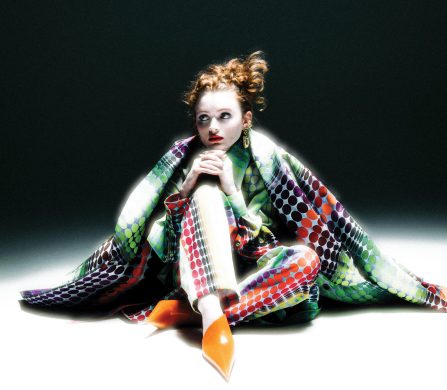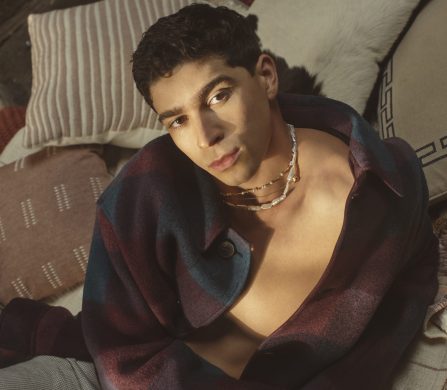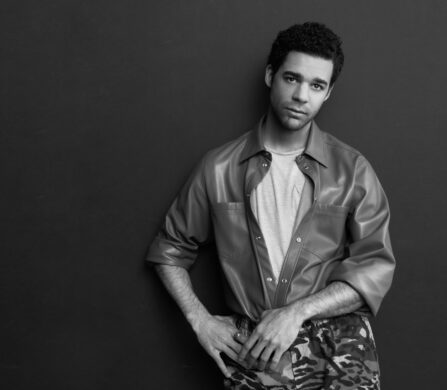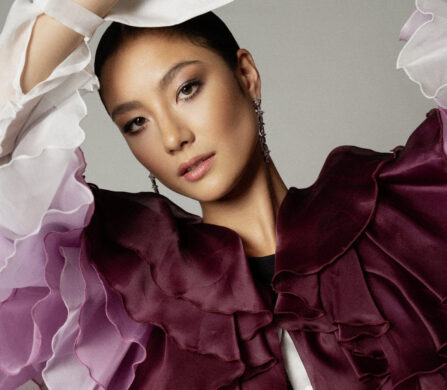
Editor’s note: In this Schön! online exclusive, photographer Abby Wright sits down and captures Hisham Qumhiyeh and José Lapaz-Rodriguez, of houses House of Eon and House of Xtravaganza, to discuss their experiences in the ballroom scene. This piece was produced and written pre-COVID-19.
José and Hisham sat down to speak with me about their stories and what inspires them to dance. I first saw them voguing at a mini ball with the House of Eon — a performing group that currently throws balls at The House of Yes and bars in Brooklyn, NY. They spoke about how their movement relates to their own stories, bodies, and the climate of the world. We wanted to talk about how they choose to dance discrimination and violence away, and how they support each other through all odds in a tense political time. José and Hisham have beautiful stories to tell through voguing and are two contemporary powerful voices of the ballroom community.
You recently performed and gave the audience a glimpse of what happens during a ball. What did you think of the experience?
Hisham: It was a great time. The house of Eon regularly throws mini balls at different locations and we think of it as a learning experience for most people. We want everyone to have fun, but we always preface each event with information of where voguing and the ballroom community comes from. I think it’s kind of difficult for us to invite people to something that they don’t know. But I’m glad because the more we perform, the more people seem to be open to joining us. It really was a fun experience overall.
Could you talk a little bit about the context in which this mini ball was made and where the movements themselves come from?
Hisham: The mini ball idea essentially comes from educating audiences to have fun. The movements came from a style known as voguing. Voguing came from the 1980s, it originated from the LGBTQ+ black and Hispanic community. Essentially the community itself was created as a way for people to escape the discrimination that they were feeling at the time. A lot of those people were homeless because they were disowned by their families, and they were being discriminated for being gay. Whenever violence would happen within the community they felt like the entire world was against them. How do we settle disputes and solve problems without actually killing each other? They decided to dance it away. The dance actually comes from models posing in Vogue magazine. If you look at old way vogue, It’s positioned and it’s made to essentially emulate models. Flash-forward, eventually voguing became this escape from the real world because you would have categories where people would live their fantasies of being real-world executives, real-world stars, and people would essentially live a superstar life through the underground scene.

You kind of already explained this, how would you explain where voguing comes from and how it inspires you now?
Hisham: Well, based on what I’ve said about voguing back then, voguing right now for me, is kind of like my voice since its how I started dancing. It’s kind of like my way of letting the world know that the same story hasn’t changed. I had to escape from a certain reality of my own upbringing because I came from a very conservative society. A lot of voguers from a previous generation are starting to come into the limelight right now. And so that kind of shows me that as long as you are true to yourself, eventually, you’ll get what you want. I feel like voguing has brought me so much right now because my style is so niche.
Can you elaborate a little bit more on what you were talking about before? What it was like growing up in a conservative society and how you used voguing as a language to break free from that?
Hisham: Yeah. I grew up in Kuwait. I was born in Malaysia and I was raised in Kuwait, which are predominantly Muslim countries. In Kuwait, it’s illegal to be gay. And so, when I was 13, I remember watching America’s best dance crew because we had that for some reason. I don’t know how but I remember I saw Leiomy Maldonado who’s this big voguer perform on TV, and I was wondering what it was. So when I looked up the style and I saw more about the language and about what it meant, it was an awakening for me. It was like, “oh! This is something for me.”
I secretly trained myself on how to dance, how to vogue, and everything. Like, whilst kind of hiding it from the conservative society I was in. Voguing was the way of me being like, “I’m a bad bitch!” It’s like when you learn how to dip for the first time, that little thing that I did to the ground, it’s kind of like, “Oh, I did that! That’s me!” And it’s so elegant and poised. The way you walk in, the attitude you have from voguing, it’s confidence. So I guess that’s why it’s inspirational. It taught me to just own who I am. I mess up all the time but I think to myself, “hair up, chin up, and whatever!”

What is your favourite aspect of performing as a dancer?
Hisham: I would say my favourite aspect of performing is having fun. It’s simple as that. I love when I get to freestyle, it’s kind of like speaking. If I can’t say it with my words, I can say with my movement. Dancing shows you who I am without me having to say much about it. On top of that, it really allows me to access parts of myself that I don’t get to see on a daily basis because we live in such a structured society, and I feel like we have rules to follow. But once I go into my artistic self, it’s, “who am I? I don’t know, but let’s check it out! Let’s go explore, and let’s do more of this.”
If you look around the world right now what do you see?
Hisham: Oh, what do I see? Oh, I see a lot of bad things! I see a lot of inequality. I see a lot of disparity in communities, especially in America. I see a lot of topics not being discussed. I see a lot of problems that are being swept under the rug. It seems to me that a lot of people tell me that if I’m trying to solve a problem, that I should just go out and fix it. Well, it’s not really that easy to solve when some of the problems are interlaced and societal norms. A lot of American culture stems from a lot of racism, homophobia, and a lot of socioeconomic inequality. The rich have been rich for so long, and the people who have been in poverty have been in poverty for so long. So for someone to come up and talk about it, it’s taboo because it disturbs the quiet.
The middle class is taught, “oh well why are we blaming the rich? Blame the poor because the poor are trying to fix the problem and they’re trying to disrupt this normal quiet that we have.” I would love to just bring more attention to something that could so easily be fixed! Jeff Bezos should not have that much money! Why does he have that much money? That is not okay? That’s inequality. Meanwhile, there are people out there who are in college debt and are getting half their paychecks cut and they don’t blame the rich for getting these tax breaks. They blame the poor because their taxes are going towards Medicare and all this. Sorry, I just went so political!

At the beginning, you were talking about how you think that people can’t understand, but I think that part of the human condition is to understand other people. How do you think we get to this place?
Hisham: People are afraid to understand because then it brings awareness to their own ignorance. People are afraid to be ignorant because we look down on ignorance in American society instead of thinking, how do we fix it? I don’t believe that when someone makes a mistake and they didn’t know it was wrong, people immediately are like, “okay, let’s take away everything from this person.” Instead of saying, “here’s what you should do next, and here’s how you can solve it.” It’s going to take a lot of responsibility. It’s going to take a lot of emotional effort, but that’s what we have to do as a society. I believe everyone can change. Perspective is really what we all lack.
I think what you were saying with American society and structure is really interesting. Anytime structure is challenged, people strongly try to stay with an old view because they don’t want to lose their security.
Hisham: Americans are taught to never risk it. Everyone talks about the American dream, but no one wants to risk anything to get the dream because they’re taught that security is the most important thing, which makes sense. It makes sense. Your security is the most important thing, but at the same time, you have to understand how to prioritize what you should risk and what you shouldn’t risk. You should take risks in your day. You should learn new things.

What kind of conversation would you like to start about voguing and how do you feel it fits into what is happening politically now?
Hisham: What kind of conversation do I want to start about voguing? I would want to start the conversation about where it comes from. People see the fun part about it, like the mini balls, the trophies, the shows, Pose on FX, and all that good stuff. But I feel like a lot of people don’t understand where it comes from. From an LGBTQ+ standpoint, you literally have all the odds stacked against you. You have no money, you have no family, you have nothing, and you only have your community. We’ve created this magnificent thing. The way society is structured has changed now but as society has progressed, people don’t know what voguing is about. People call things death drops and all this stuff. It’s not anyone’s fault other than the media because they’re advertising what’s not true. We see pride as a stereotype of these white gays, all this rainbow stuff, and all this happiness — drugs and alcohol, but pride started with the Stonewall riots. It really starts with that. It started with a lot of chaos and destruction. It came from a place of darkness. We just want to celebrate the happy, which is great, but it’s like, how are you going to appreciate the happy moments if you don’t understand the sad moments in your life? I want society to understand that you can celebrate your life, have fun, and do all this good stuff. But understand that it took us a long time to get here and there’s still work to be done. If we can progress from where we started, then we can progress even further. And this is not good enough. Half-assed decency is not good enough. In America, if we can still get fired for being gay, then you are not doing good enough. Marriage is one thing, but marriage is just a decency. That’s just a human right. No one should have the privilege to dictate what a human can do just based on their sexual orientation. It’s outrageous.
How do you feel voguing fits into what is happening politically now?
Hisham: I feel like it really fits into politics now because in the ballroom community, especially most of the people who are in the vogue community, are not in the higher income tax bracket. Why is it that a lot of queer people and people of colour are the ones that are in these lower income tax brackets? Why aren’t there more resources for people who have these families that kick them out? We have a lot, I feel like we need to bring that more into politics too, like talking about how queer culture is demonized in a lot of American politics. We celebrate it on certain platforms, but for the most part, if you tell a kid that someone’s gay, it’s a taboo. I would also like to talk about the concept of gay culture being sexualized. I feel like that’s also messed up. The reason why we think it’s taboo to tell our kids about gay culture is because we see gay culture as something really sexual when it’s not. It’s just a life. It’s just a person. I wouldn’t say it’s the same as race per se, obviously, but it’s more like, why are we making this an adult conversation when it should be an everybody conversation? I feel like queer kids, in general, are encouraged to be more sexualized because of the fact that that’s all they see on TV. That’s all they see in politics. They see the concept of marriage and they see the concept of sex and, you know, it’s like being gay is not about sex and marriage. Your gayness is not your identity. You are your own identity. I don’t think sexuality and identity are the same things, that’s what I’m saying. We could also bring more awareness to queer politics outside of America. Because currently, you know, in Kuwait as I mentioned where I grew up, it’s illegal to be gay and you can get killed. We should talk about the fact that a lot of these countries view queerness as a demonic entity and when in reality a lot of their society is probably gay. It’s toxic masculinity. I think toxic masculinity stems from the fear of being queer. Certainly, we associate the idea of femininity in men with being queer. And then this is another whole conversation. I can open up! I went on seven tangents but that’s my stance on everything.

José speaks about how he feels supported by his chosen family, principally his chosen father Slim Extravaganza. He sees voguing as a good way to teach young people not to divide dance gender so they can be free to express themselves, and he also sees ballroom as a huge confidence builder. José recently lost his biological father and talks about how he finds solace and support from voguing and the ballroom community.
You recently performed at a mini ball and gave the audience a glimpse of what happens during a ball. What did you think of the experience?
José: I think of the experience as unique, it takes a lot of courage to walk a category (in a ball) and that night I did runway and vogue as well. It does bring a lot of joy and so much confidence because I felt so much support from my chosen family and those who aspire to one day walk a ball.
How would you explain where voguing comes from and how it inspires you now?
José: Vouging comes from poses that people from the ballroom scene would get from Vogue magazine. From poses they would put it all together to create a dance, they would listen to the beat of the music and improv different poses with any part of their body to create such a luxurious, glamorous and fabulous presence. When I do new way vogue, I tried to incorporate contemporary in it, which is more fluid. From there, I can use my entire body to transition to different poses by creating lines with other parts of my body. I love incorporating embellishments as well. It’s the same in the way I use ballet because I can create a lot of lines. It kind of correlates with each other.

What is your favourite aspect of performing as a dancer?
José: Favourite aspect… when I perform, I want to inspire. I love to inspire people, to make them feel something, really to make them feel good about themselves and let them know that they can do what I can do. I like to spread confidence.
What kind of conversation would you like to start about ballroom and what do you see going on in the world now?
José: I’ve been thinking a lot about kids learning to vogue just because it’s such a confidence builder. And I’ve been teaching this summer to kids from six to nine and through the weeks I started seeing improvement, not just in their body, but also in their personality and discipline as well. It’s definitely a conversation to have because it’s also a type of dance that is gender-neutral. And it’s important for kids to learn not divide dance in genders because that restricts them from expressing however they want to. I see an imperfect world, especially in the ballroom community. There’s so much going on with inequality, in our own community for trans women of colour and gay men as well. It makes me feel that it is unfair because the trans women of colour were the ones who created this space in the ballroom scene. They gave access for us to express what we want. They’re the ones that helped us to be as strong as they are in our everyday lives.

Could you describe how you feel about performing and the ballroom scene?
José: The mini ball was an excerpt of a big ball, which is more strict, more money, more trophies, and more competition. We have categories like face voguing, all three styles of the old way, vogue femme or new way. We also have best dress, and labels. Basically the balls create a safe space for queer people of colour to express what they want to express. If you want to wear a wig, you can wear a wig and go out and compete in your wig and whatever thing you made, that will give you an effect. That’s what we call it, an effect, when we create our own things. Like if I had my whole latex suit here today. That will be giving you an effect. Someone made it for me at the Ailey studios, which is really nice. I remember my first ball was last year in August, the Heritage Ball, I went with my friend Sunny. The ball was supposed to go from 8 pm until 6 am. It was overwhelming at first because there’s so many people that you don’t know and the speakers were really loud, I just didn’t know what to do. But it’s was really nice because everyone was very accepting, which is truly amazing. It was great to see my mentor, Jason, perform because he does what he wants as a Dominican person of colour. It’s very inspiring to see, and there’s so much one can take from there. It’s really beautiful. It’s just a joy.
How would you describe your chosen family?
José: I’m quoting from Paris is Burning, basically a gay gang or like your chosen family. There are people who have been taken out of their homes because their parents weren’t as accepting of their sexuality and their gender identity as well. The ballroom scene created these houses to welcome those who weren’t accepted, to build them back up and make them own themselves, their body, and their feelings so no one can put them down anymore. That’s how the houses work and they’re just very supportive. My father is Slim Extravaganza. I don’t have a mother. He has been very supportive ever since I went to his classes. He’ll come to my shows even though I live outside of the city. I help him pick out his clothes when we go out, it’s basically like a normal family bond, which is amazing, it’s just something good to have now that I recently lost my biological father. I did not really have a good relationship with him. But, I still love him. I feel like I see some part of my biological dad in Jason and it makes me happy. All he does is spread love, and that’s literally all I need. Even in the toughest times, he helped me. That is what you would call family, not just blood. Anyone who can support you emotionally, who will be there for you all the time, that’s family.

This Schön! online exclusive has been produced by
photography + interview. Abby Wright
dancers. Hisham Qumhiyeh + José Lapaz-Rodriguez
houses. House of Eon + House of Xtravaganza


Schön! Magazine is now available in print at Amazon,
as ebook download + on any mobile device
















